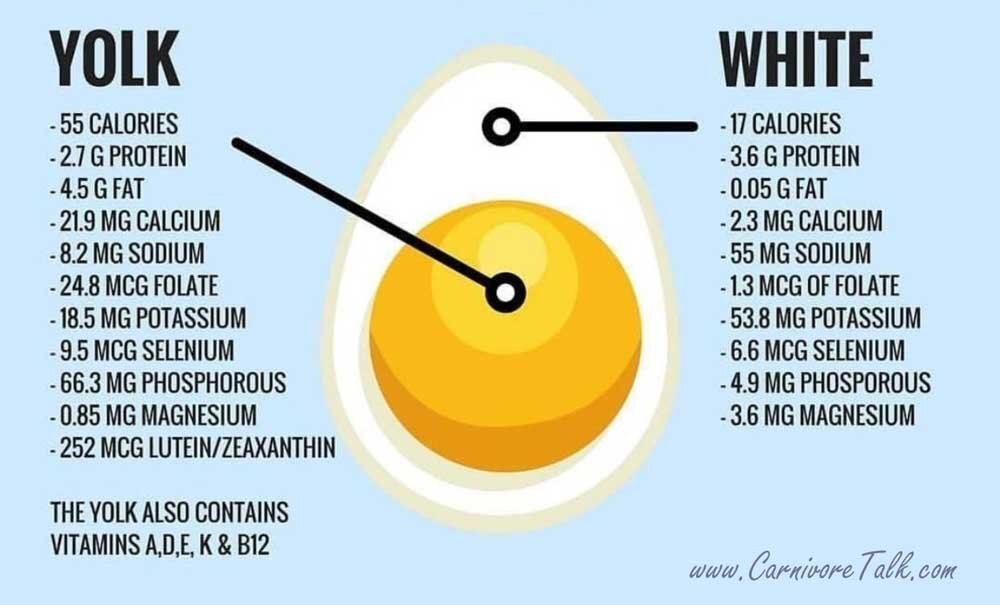.
Eggs are one of the most versatile and nutritious foods on the planet. Yes, we are serious when we make that statement. They are a great source of protein, healthy fats, antioxidants, and contain a variety of essential vitamins and minerals. They are also low in carbs, making them perfectly suited for keto and carnivore diets. But whether you are following a low-carb, keto, paleo, or any other type of diet, there is probably an egg recipe that will suit your needs and preferences. There are many nutritional advantages to eggs, and to get the most out of them you want to consume both the whites and the yolks. Here are some of the benefits of eating eggs and some delicious ways to prepare them.
Protein and healthy fats
Eggs are a complete protein, meaning they contain all nine essential amino acids that your body cannot produce on its own. The high-quality protein found in eggs is essential for building and repairing muscle tissue, bones, skin, and hair, as well as producing hormones and enzymes. Protein also helps you feel full and satisfied, which can prevent overeating and cravings. One egg contains about 6 grams of protein.
Eggs are a good source of healthy fats, such as monounsaturated and polyunsaturated fats. These fats can lower the risk for heart disease and are beneficial for brain function and hormone production. Eggs are also one of the few natural sources of Vitamin D which is important for bone health and immune function.
Vitamins and minerals
Eggs are packed with many essential vitamins and minerals, including choline, selenium, vitamin A, vitamin B12, riboflavin, folate, iron, and zinc. Choline is an important nutrient for brain health and development. Vitamin A is vital for vision, skin health, and immune function. Vitamin B12 is important for production of red blood cells, DNA, and nerve function. Folate is essential for cell division, DNA synthesis, and fetal development, and riboflavin is important for energy production, antioxidant defense, and eye health.
Of the minerals, phosphorous helps regulate acid-base balance, and is a component of bones, teeth, DNA, RNA, and cell membranes. Then selenium is a powerful antioxidant that protects cells from oxidative stress and damage. It also supports thyroid function and reproductive health.
Antioxidants
Eggs contain two antioxidants that are especially beneficial for eye health: lutein and zeaxanthin. These antioxidants accumulate in the retina and protect it from harmful blue light and age-related macular degeneration. They may also help prevent cataracts and improve visual acuity.

How to eat eggs
In addition to their nutritional advantages, eggs are also a versatile and affordable food. They can be cooked in a variety of ways, and they can be used as an ingredient in many different dishes.
There are many ways to enjoy eggs as part of a healthy diet. You can have them scrambled, boiled, poached, fried, baked, or made into an omelet or a frittata. You can also add them to salads, sandwiches, soups, casseroles, or stir-fries. You can even make egg muffins or egg cups for a quick and easy breakfast on the go.
Perfect for keto and carnivore diets
Keto and carnivore diets are both low-carb diets, and eggs are a naturally low-carb food. A large egg contains only 0.6 grams of carbs. Eggs are also high in protein and fat, which are the two main macronutrients that are consumed on keto and carnivore diets.
Eggs can be included in your keto or carnivore diet in a variety of ways. Here are a few ideas:
Breakfast: Eggs are a popular breakfast food on keto and carnivore diets. They can be cooked in a variety of ways, such as scrambled, fried, or omeleted. Eggs can also be used to make breakfast dishes such as quiches and frittatas.
Lunch: Eggs can also be included in lunch meals. For example, you could make an egg salad sandwich, a hard-boiled egg salad, or an egg wrap. Eggs can also be added to salads or soups.
Dinner: Eggs can also be included in dinner meals. For example, you could make a steak and eggs dish, a bacon and eggs dish, or an omelet with vegetables and meat.
Eggs are a versatile, nutritious, wonderful food that can provide you with many health benefits and delicious meals. They can be adapted to suit your preferences and needs. Everyone should include more eggs in their diet, especially if you are following a keto or carnivore diet.
Your choice of egg matters!
Of all the eggs available including caged, free-range, organic free-range, and pasture-raised, pasture-raised eggs are the best ones to eat.
Caged eggs are laid by hens that spend their entire life in cages. They eat, poop, and lay eggs in the same crowded cages. Free-range eggs are eggs laid by hens that are housed in cages but do have outdoor access. There will not be much nutritional difference between these two types of eggs.
However, Organic free-range eggs are laid by hens that have outdoor access and are fed organic feed. These eggs will have a higher vitamin content, but the prize has to go to Pasture-raised eggs. These eggs are laid by hens that spend their time outdoors during the day and only go indoors at night to sleep. As a result, they feed on whatever they can find in the pasture, including insects, bugs, grubs, grass, and whatever else they can find. Pasture-raised eggs are of superior quality compared to caged chickens, and you will see that reflected in the price.
Where to Buy?
We recommend buying local. Find a farmer, rancher, or other local person who is selling eggs in your local community. You can search for local eggs on Google, or you can use a site like EggsNearby.com where some individuals list or advertise eggs for sale.




Recommended Comments
Join the conversation
You are posting as a guest. If you have an account, sign in now to post with your account.
Note: Your post will require moderator approval before it will be visible.